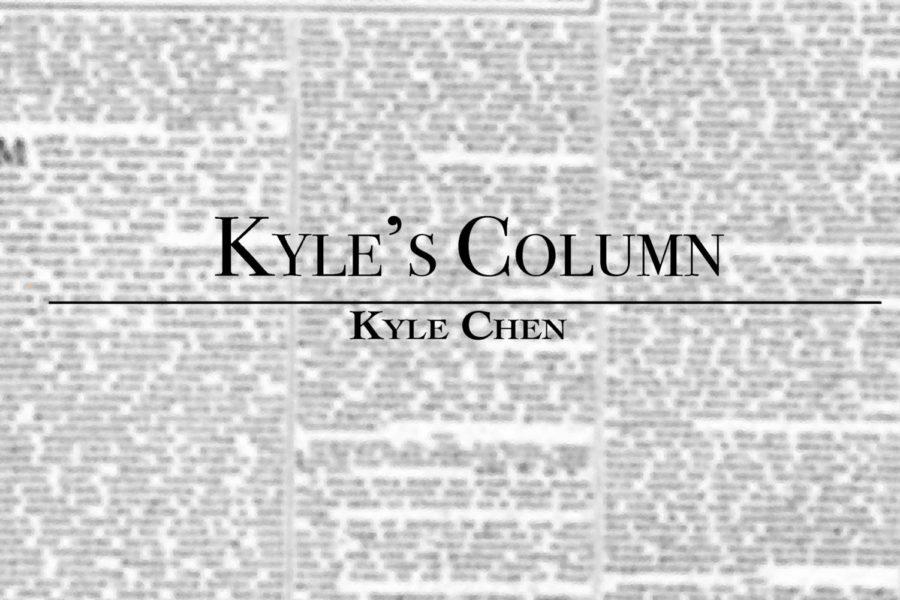Kyle’s Column: Memorial Day – More than just a time for gratitude
In the latest installment of Kyle’s Column, WSPN’s Opinions Editor Kyle Chen reflects upon the lessons that come with having a cold.
May 30, 2018
This past Monday, I attended the annual Memorial Day celebration held in the Lakeview Cemetery. Despite a morning of overcast skies, a pretty large group of townspeople showed up, occupying the rings of grass and the asphalt walkways surrounding the center of the cemetery. A line of police officers stood in a semicircle, and adjacent to them rested an army green troop carrier and an old police cruiser. The crowd stood quietly, giving their attention respectfully to the podium, where a series of veterans gave speeches.
I’ve never been to Memorial Day celebrations in other towns, but I can’t imagine they get much better than what we see in Wayland. Throughout the whole time I stood by that police cruiser, there was an atmosphere of quiet awe in the crowd, one of true humility; a real sense that we as citizens held more respect and gratitude for our veterans than we could put into words.
Memorial Day has always been a time of remembrance. It’s a day where we as a people step back and take a moment out of their daily lives to pay tribute to the those who lay down their lives for our country. In my experience, anyway, it’s also been a time for appreciation. People don’t just remember those who have died fighting for our country; we take the time to thank those who do so today. I’d say it’s pretty common for someone to approach a veteran or active member of the U.S. armed forces on Memorial Day and thank them for their service. After all, we owe just as much to them as we do to our fallen soldiers.
But gratitude isn’t always enough. Even a community like Wayland, filled with people who recognize and understand the scope of the true sacrifices our soldiers make, cannot and should not be confined to expressing our gratitude through words. Maybe I’m taking a bit of an exaggerated viewpoint on the matter – after all, I’m currently reading Remarque’s All Quiet on the Western Front in English class – but I believe that appreciative words are not sufficient. One of Remarque’s most dire messages is that war is destructive in a magnitude unimaginable to the common civilian and that ordinary, everyday citizens cannot possibly comprehend the truth of living through a war. We’ve never felt our world shake from an artillery bombardment; we’ve never heard the scream of bullets whistling through the air. At one point during the ceremony, the American Legion Firing Detail saluted the veterans by firing a series of blank rounds into the sky. Even from afar, the sound of the blasts was enough to make my eardrums ring; I can’t imagine what the noise on the battlefield must be like.
War is an experience that is indescribable through words. There is no way any civilian can truly empathize with a veteran unless he himself has experienced the horrors of war. Our paltry words of gratitude, then, pale in light of the sheer incomprehensibility of what our veterans have gone through. I cannot speak for anyone but myself, but if I were a veteran, I wouldn’t want just words and phrases of thanks. Alone, those are meaningless.
Even if it is impossible to fully empathize with our veterans, we should at least take it upon ourselves to recognize the magnitude of their sacrifice. Even if it isn’t us who are impacted by the horrors of the war, we should acknowledge the impact that it may have had on others. It’s time that we appreciate our veterans by reducing the cost of war for future generations. Writers like Remarque, himself a war veteran, recognized this need and sought to create change. Though it is too late to rewrite the past, we can change the future for the better by understanding the true costs of war and preventing its outbreak by all means necessary. Thus we may, as Remarque would put it, save future generations from being destroyed by war.
Opinion articles written by staff members represent their personal views. The opinions expressed do not necessarily represent WSPN as a publication.





![Last Wednesday, the Wayland School Committee gathered to discuss a number of topics regarding the health curriculum and Innovation Career Pathway course. Another large topic of conversation was the ways to potentially mitigate distracting cell phone usage. "These [phones] are going to distract your learning and social relationships," Superintendent David Fleishman said. "That's concrete right there."](https://waylandstudentpress.com/wp-content/uploads/2025/06/Screenshot-2025-06-04-at-9.49.31 PM-1200x886.png)

























